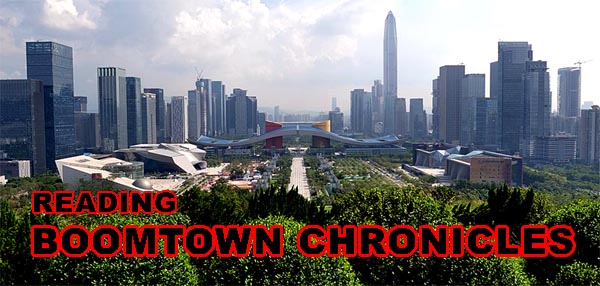 |
| Shenzhen, the Boomtown (Wikipedia) |
Note: Between Lesson #01-128 and #01-207, I wrote 72 lessons explaining expressions in articles published in the Shenzhen Daily. Read more about "Reading Boomtown Chronicles."
Get Ready: What kind of taboos do you encounter regularly?
Boomtown Chronicles Part VI - published Monday, July 21, 2008 (cont.)
We continue with Part II of the profile of Yuan Geng, leader of the reform in Shenzhen's Shekou area.
- "the shipping and industrial businesses in Shekou thrived."
thrive: from an Old Norse word meaning "to grasp" or "cling," so one who thrives is grabbing onto life and prosperity "with both hands," as we say.
- "Yuan's audacity climaxed between 1983 and 1985" with the institution of free elections and transparent media.
climax: the high point any story, the peak of the action. The original Greek word klimax meant "ladder," which would be used to climb to a high place, and the modern meaning comes from that association.
- Elections and open media were "areas long considered taboo in China."
taboo: a word that anthropologists picked up from some of the peoples they were studying, perhaps the Tongans or Fijians. These Polynesian groups used it to describe things or practices that were forbidden because of a sacred principle. These days, we use it more broadly to describe anything that is prohibited by custom (but not usually by law).
- Yuan Geng says, "Power without checks and balances will lead to corruption."
checks and balances: a fixed phrase, in which "checks" means ways to stop anyone from abusing the power, and "balances" guarantee that no one segment of government (for example, the courts or the legislative body) becomes more powerful than any other.
- A "confidence vote"
confidence vote: Rather than pitting two or more candidates against each other, as in the usual idea of elections, the confidence vote is a process by which the voters (or, more commonly, a legislative body) give "thumbs up" or "thumbs down" to a person or administration already seated, choosing either to keep them in office, or to cause their removal.
- Yuan also chose to "scrap censorship for a newspaper in Shekou."
scrap: to discard or eliminate; here it means to "discontinue" the practice of censorship. A scrap is a piece of something, generally too small to be used (scraps of cloth, for example, or the scraps of meat trimmed off before the meat is cooked). These can be "thrown on a scrap heap," or simply, "scrapped." The word can be used figuratively for a change of plan or policy, as here.
--------
Read more: https://en.wikipedia.org/wiki/Shenzhen
Practice: Choose the correct term to fill in the blank in the sentence below:
- checks and balances
- climax
- confidence vote
- scrap
- taboo
- thrive
- No one would commit to the project, so they had to ________ it.
- The audience was upset when, just as the film was about to reach its ________, the power went out.
- Any good system of government will build in ________ to prevent a takeover.
- Some cultures consider eating with the left hand to be ________
- You'll need the right balance of light and moisture if you want your houseplants to ________.
- The prime minister lost the cabinet's ________ and had to resign.
Answers are in the first comment below.
Submitted to the Shenzhen Daily for July 29, 2008


Answers to the Practice: 1. c; 2. b; 3. f; 4. a; 5. d; 6. e
ReplyDelete